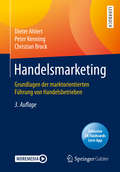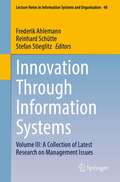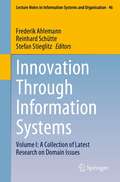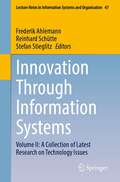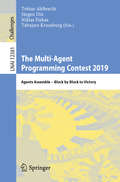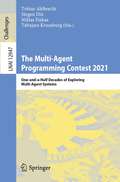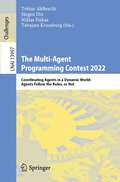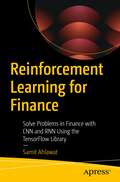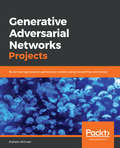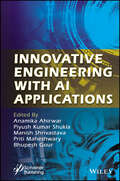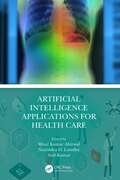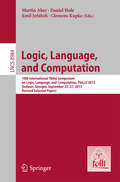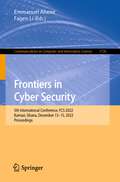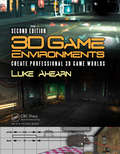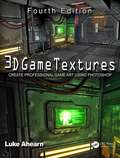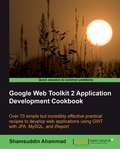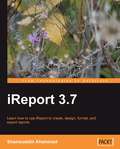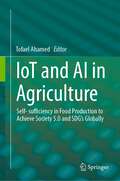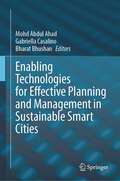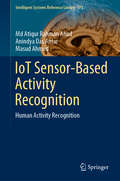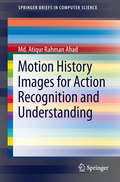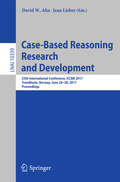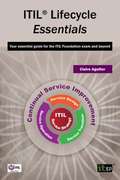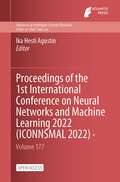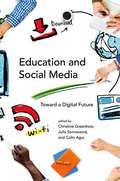- Table View
- List View
Handelsmarketing: Grundlagen der marktorientierten Führung von Handelsbetrieben (Springer-lehrbuch Ser.)
by Dieter Ahlert Peter Kenning Christian BrockDieses Lehrbuch führt in die grundlegenden Konzepte, Methoden und Anwendungen der marktorientierten Führung von Handelsbetrieben ein. Die Autoren veranschaulichen diese anhand von Erkenntnissen aus der Forschung sowie Beispielen aus der Unternehmenspraxis. Leser und Leserinnen können sich so ein Basiswissen aneignen, das ihnen auch den Zugang zu speziellen Teilgebieten des Handelsmarketing ermöglicht. In der dritten Auflage wurden die mit der Digitalisierung verbundenen neueren Entwicklungen, Methoden und Konzepte – wie z. B. die Ausführungen zu den Themen „Plattformökonomie“, „Dynamic Pricing“ sowie „Instore Kommunikation“ – systematisch integriert. Insbesondere wurde die dritte Auflage um digitale Karteikarten („Flashcards“) als Lehr- und Lernmittel ergänzt. Laden Sie die Springer Nature Flashcards-App kostenlos herunter und nutzen Sie exklusives Zusatzmaterial, um Ihr Wissen zu prüfen. Der Inhalt• Grundlagen des Handelsmarketing • Informationsgrundlagen des Handelsmarketing • Ziele und Strategien • Die Betriebstypenpolitik • Markenpolitik im Handel • Die Standortpolitik • Die Sortimentspolitik • Die Personalpolitik • Die Preispolitik • Die Präsentationspolitik • Die Kommunikationspolitik • Customer Relationship Management im Handel • Multikanalmanagement • Handelscontrolling
Innovation Through Information Systems: Volume III: A Collection of Latest Research on Management Issues (Lecture Notes in Information Systems and Organisation #48)
by Frederik Ahlemann Reinhard Schütte Stefan StieglitzThis book presents the current state of research in information systems and digital transformation. Due to the global trend of digitalization and the impact of the Covid 19 pandemic, the need for innovative, high-quality research on information systems is higher than ever. In this context, the book covers a wide range of topics, such as digital innovation, business analytics, artificial intelligence, and IT strategy, which affect companies, individuals, and societies. This volume gathers the revised and peer-reviewed papers on the topic "Management" presented at the International Conference on Information Systems, held at the University of Duisburg-Essen in 2021.
Innovation Through Information Systems: Volume I: A Collection of Latest Research on Domain Issues (Lecture Notes in Information Systems and Organisation #46)
by Frederik Ahlemann Reinhard Schütte Stefan StieglitzThis book presents the current state of research in information systems and digital transformation. Due to the global trend of digitalization and the impact of the Covid 19 pandemic, the need for innovative, high-quality research on information systems is higher than ever. In this context, the book covers a wide range of topics, such as digital innovation, business analytics, artificial intelligence, and IT strategy, which affect companies, individuals, and societies. This volume gathers the revised and peer-reviewed papers on the topic "Domain" presented at the International Conference on Information Systems, held at the University of Duisburg-Essen in 2021.
Innovation Through Information Systems: Volume II: A Collection of Latest Research on Technology Issues (Lecture Notes in Information Systems and Organisation #47)
by Frederik Ahlemann Reinhard Schütte Stefan StieglitzThis book presents the current state of research in information systems and digital transformation. Due to the global trend of digitalization and the impact of the Covid 19 pandemic, the need for innovative, high-quality research on information systems is higher than ever. In this context, the book covers a wide range of topics, such as digital innovation, business analytics, artificial intelligence, and IT strategy, which affect companies, individuals, and societies. This volume gathers the revised and peer-reviewed papers on the topic "Technology" presented at the International Conference on Information Systems, held at the University of Duisburg-Essen in 2021.
The Multi-Agent Programming Contest 2019: Agents Assemble – Block by Block to Victory (Lecture Notes in Computer Science #12381)
by Tobias Ahlbrecht Jürgen Dix Niklas Fiekas Tabajara KrausburgThis book constitutes the 14th edition of the annual Multi-Agent Programming Contest, MAPC 2019, and presents its participants.The 2019 scenario and all its changes from previous competitions are described in the first contribution, together with a brief description and analysis of the five participating teams and a closer look at the matches. It is followed by a contribution from each team, introducing their methods and tools used to create their agent team and analyzing their performance and the contest.
The Multi-Agent Programming Contest 2021: One-and-a-Half Decades of Exploring Multi-Agent Systems (Lecture Notes in Computer Science #12947)
by Tobias Ahlbrecht Jürgen Dix Niklas Fiekas Tabajara KrausburgThis book constitutes the 15th edition of the annual Multi-Agent Programming Contest, MAPC 2020. It gives an overview of the competition, describes the current scenario. Furthermore, it summarises this year's participants and their approaches and analyses some of the matches played and the contest as a whole. In the second part, each team contributed a paper describing their approach and experiences with creating a team of agents to participate in the contest.
The Multi-Agent Programming Contest 2022: Coordinating Agents in a Dynamic World: Agents Follow the Rules, or Not (Lecture Notes in Computer Science #13997)
by Tobias Ahlbrecht Jürgen Dix Niklas Fiekas Tabajara KrausburgThis book constitutes the 16th edition of the annual Multi-Agent Programming Contest, MAPC 2022. It gives an overview of the competition, describes the current scenario. The first paper describes the contest in general and this edition in particular, focusing on the organizers’ observations. The following papers are written by the participants of the contest, describing their team of agents and its performance in more detail.
Reinforcement Learning for Finance: Solve Problems in Finance with CNN and RNN Using the TensorFlow Library
by Samit AhlawatThis book introduces reinforcement learning with mathematical theory and practical examples from quantitative finance using the TensorFlow library.Reinforcement Learning for Finance begins by describing methods for training neural networks. Next, it discusses CNN and RNN – two kinds of neural networks used as deep learning networks in reinforcement learning. Further, the book dives into reinforcement learning theory, explaining the Markov decision process, value function, policy, and policy gradients, with their mathematical formulations and learning algorithms. It covers recent reinforcement learning algorithms from double deep-Q networks to twin-delayed deep deterministic policy gradients and generative adversarial networks with examples using the TensorFlow Python library. It also serves as a quick hands-on guide to TensorFlow programming, covering concepts ranging from variables and graphs to automatic differentiation, layers, models, and loss functions.After completing this book, you will understand reinforcement learning with deep q and generative adversarial networks using the TensorFlow library.What You Will LearnUnderstand the fundamentals of reinforcement learningApply reinforcement learning programming techniques to solve quantitative-finance problemsGain insight into convolutional neural networks and recurrent neural networksUnderstand the Markov decision processWho This Book Is ForData Scientists, Machine Learning engineers and Python programmers who want to apply reinforcement learning to solve problems.
Generative Adversarial Networks Projects: Build next-generation generative models using TensorFlow and Keras
by Kailash AhirwarThis book is intended for data scientists, machine learning developers, deep learning practitioners and AI enthusiasts who want a project guide to test their knowledge and expertise in building real-world GANs models. These full-fledged projects will help you master machine learning, and neural network principles. Basic understanding of machine learning and deep learning concepts will be handy. Hands-on experience in Tensorflow or Keras will be a plus point
Innovative Engineering with AI Applications
by Anamika Ahirwar Piyush Kumar Shukla Manish Shrivastava Priti Maheshwary Bhupesh GourInnovative Engineering with AI Applications Innovative Engineering with AI Applications demonstrates how we can innovate in different engineering domains as well as how to make most business problems simpler by applying AI to them. Engineering advancements combined with artificial intelligence (AI), have resulted in a hyper-connected society in which smart devices are not only used to exchange data but also have increased capabilities. These devices are becoming more context-aware and smarter by the day. This timely book shows how organizations, who want to innovate and adapt, can enter new markets using expertise in various emerging technologies (e.g. data, AI, system architecture, blockchain), and can build technology-based business models, a culture of innovation, and high-performing networks. The book specifies an approach that anyone can use to better architect, design, and more effectively build things that are technically novel, useful, and valuable, and to do so efficiently, on-time, and repeatable. Audience The book is essential to AI product developers, business leaders in all industries and organizational domains. Researchers, academicians, and students in the AI field will also benefit from reading this book.
Artificial Intelligence Applications for Health Care
by Mitul Kumar Ahirwal Narendra D. Londhe Anil KumarThis book takes an interdisciplinary approach by covering topics on health care and artificial intelligence. Data sets related to biomedical signals (ECG, EEG, EMG) and images (X-rays, MRI, CT) are explored, analyzed, and processed through different computation intelligence methods. Applications of computational intelligence techniques like artificial and deep neural networks, swarm optimization, expert systems, decision support systems, clustering, and classification techniques on medial datasets are explained. Survey of medical signals, medial images, and computation intelligence methods are also provided in this book. Key Features Covers computational Intelligence techniques like artificial neural networks, deep neural networks, and optimization algorithms for Healthcare systems Provides easy understanding for concepts like signal and image filtering techniques Includes discussion over data preprocessing and classification problems Details studies with medical signal (ECG, EEG, EMG) and image (X-ray, FMRI, CT) datasets Describes evolution parameters such as accuracy, precision, and recall etc. This book is aimed at researchers and graduate students in medical signal and image processing, machine and deep learning, and healthcare technologies.
Logic, Language, and Computation
by Martin Aher Daniel Hole Emil Jeřábek Clemens KupkeThis book constitutes the refereed proceedings of the 10th International Tbilisi Symposium on Logic, Language and Computation, TbiLLC 2013, held in Gudauri, Georgia, in September 2013. The conference series is centered around the interaction between logic, language and computation. The contributions represent these three fields and the symposia aim to foster interaction between them. The book consists of 16 papers that were carefully reviewed and selected from 26 submissions. Each paper has passed through a rigorous peer-review process before being accepted for publication. The volume also contains two summaries of the tutorials that took place at the symposium: the one on admissible rules and the one on the formal semantics of aspectual meaning from a cross-linguistic perspective.
Frontiers in Cyber Security: 5th International Conference, FCS 2022, Kumasi, Ghana, December 13–15, 2022, Proceedings (Communications in Computer and Information Science #1726)
by Emmanuel Ahene Fagen LiThis book constitutes the refereed proceedings of the 5th International Conference on Frontiers in Cyber Security, FCS 2022, held in Kumasi, Ghana, during December 13–15, 2022. The 26 full papers were included in this book were carefully reviewed and selected from 65 submissions. They were organized in topical sections as follows: ioT Security; artificial intelligence and cyber security; blockchain technology and application; cryptography; database security; quantum cryptography; and network security.
3D Game Environments: Create Professional 3D Game Worlds
by Luke AhearnFrom a steamy jungle to a modern city, or even a sci-fi space station, 3D Game Environments is the ultimate resource to help you create AAA quality art for a variety of game worlds. Primarily using Photoshop and 3ds Max, students will learn to create realistic textures from photo source and a variety of techniques to portray dynamic and believable game worlds. With detailed tutorials on creating 3D models, applying 2D art to 3D models, and clear concise advice on issues of efficiency and optimization for a 3D game engine, Luke Ahearn gives you everything students need to make their own realistic game environments.
3D Game Textures: Create Professional Game Art Using Photoshop
by Luke AhearnThe new edition of 3D Game Textures: Create Professional Game Art Using Photoshop features the most up-to-date techniques that allow you to create your own unique textures, shaders, and materials. Revised to take new technology into account, it is an ideal hands-on resource for creating online worlds, simulations, web-based applications, and architectural visualization projects. Continuing the practical, no-nonsense approach of its predecessors, the fourth edition shows you how to advance your digital art skills with textures and shaders by exploring their interactions in single objects or entire scenes. It contains expanded coverage of shader nodes, and the companion website—www.lukeahearn.com/textures—has been updated to include video tutorials as well as updated sample textures, shaders, materials, actions, brushes, and all of the art from the book.
Google Web Toolkit 2 Application Development Cookbook
by Shamsuddin AhammadThe recipes in this book are in a straightforward and easy to follow format.The range of topics covered in this book will bring out the forward-thinking Java developer in you.If you want to build AJAX web applications with GWT then this book is for you.Developers with prior programming experience of Java development and object-oriented programming will find this book very useful.
iReport 3.7
by Shamsuddin AhammadStep-by-step example-driven tutorials make this book very easy to follow. Practical, realistic business examples, many relevant screenshots, and simple discussion of prior concepts help readers to understand from the simplest to the most complex concepts. This book is for business intelligence reporting tool users and developers who have working experience in Java but are new to iReport. The book covers from developing a simple report to charting and producing summary reports in iReport, so it is suitable both for the initial learners and experts who produce extensive reports for business applications.
IoT and AI in Agriculture: Self- sufficiency in Food Production to Achieve Society 5.0 and SDG's Globally
by Tofael AhamedThis book reviews recent innovations in the smart agriculture space that use the Internet of Things (IoT) and sensing to deliver Artificial Intelligence (AI) solutionsto agricultural productivity in the agricultural production hubs. In this regard, South and Southeast Asia are one of the major agricultural hubs of the world, facing challenges of climate change and feeding the fast-growing population. To address such challenges, a transboundary approach along with AI and BIG data for bioinformatics are required to increase yield and minimize pre- and post-harvest losses in intangible climates to drive the sustainable development goal (SDG) for feeding a major part of the 9 billion population by 2050 (Society 5.0 SDG 1 & 2). Therefore, this book focuses on the solution through smart IoT and AI-based agriculture including pest infestation and minimizing agricultural inputs for in-house and fields production such as light, water, fertilizer and pesticides to ensure food security aligns with environmental sustainability. It provides a sound understanding for creating new knowledge in line with comprehensive research and education orientation on how the deployment of tiny sensors, AI/Machine Learning (ML), controlled UAVs, and IoT setups for sensing, tracking, collection, processing, and storing information over cloud platforms for nurturing and driving the pace of smart agriculture in this current time. The book will appeal to several audiences and the contents are designed for researchers, graduates, and undergraduate students working in any area of machine learning, deep learning in agricultural engineering, smart agriculture, and environmental science disciplines. Utmost care has been taken to present a varied range of resource areas along with immense insights into the impact and scope of IoT, AI and ML in the growth of intelligent digital farming and smart agriculture which will give comprehensive information to the targeted readers.
Enabling Technologies for Effective Planning and Management in Sustainable Smart Cities
by Mohd Abdul Ahad Gabriella Casalino Bharat BhushanWith the rapid penetration of technology in varied application domains, the existing cities are getting connected more seamlessly. Cities becomes smart by inducing ICT in the classical city infrastructure for its management. According to McKenzie Report, about 68% of the world population will migrate towards urban settlements in near future. This migration is largely because of the improved Quality of Life (QoL) and livelihood in urban settlements. In the light of urbanization, climate change, democratic flaws, and rising urban welfare expenditures, smart cities have emerged as an important approach for society’s future development. Smart cities have achieved enhanced QoL by giving smart information to people regarding healthcare, transportation, smart parking, smart traffic structure, smart home, smart agronomy, community security etc. Typically, in smart cities data is sensed by the sensor devices and provided to end users for further use. The sensitive data is transferred with the help of internet creating higher chances for the adversaries to breach the data. Considering the privacy and security as the area of prime focus, this book covers the most prominent security vulnerabilities associated with varied application areas like healthcare, manufacturing, transportation, education and agriculture etc. Furthermore, the massive amount of data being generated through ubiquitous sensors placed across the smart cities needs to be handled in an effective, efficient, secured and privacy preserved manner. Since a typical smart city ecosystem is data driven, it is imperative to manage this data in an optimal manner. Enabling technologies like Internet of Things (IoT), Natural Language Processing (NLP), Blockchain Technology, Deep Learning, Machine Learning, Computer vision, Big Data Analytics, Next Generation Networks and Software Defined Networks (SDN) provide exemplary benefits if they are integrated in the classical city ecosystem in an effective manner. The application of Artificial Intelligence (AI) is expanding across many domains in the smart city, such as infrastructure, transportation, environmental protection, power and energy, privacy and security, governance, data management, healthcare, and more. AI has the potential to improve human health, prosperity, and happiness by reducing our reliance on manual labor and accelerating our progress in the sciences and technologies. NLP is an extensive domain of AI and is used in collaboration with machine learning and deep learning algorithms for clinical informatics and data processing. In modern smart cities, blockchain provides a complete framework that controls the city operations and ensures that they are managed as effectively as possible. Besides having an impact on our daily lives, it also facilitates many areas of city management.
IoT Sensor-Based Activity Recognition: Human Activity Recognition (Intelligent Systems Reference Library #173)
by Md Atiqur Ahad Anindya Das Antar Masud AhmedThis book offer clear descriptions of the basic structure for the recognition and classification of human activities using different types of sensor module and smart devices in e.g. healthcare, education, monitoring the elderly, daily human behavior, and fitness monitoring. In addition, the complexities, challenges, and design issues involved in data collection, processing, and other fundamental stages along with datasets, methods, etc., are discussed in detail. The book offers a valuable resource for readers in the fields of pattern recognition, human–computer interaction, and the Internet of Things.
Motion History Images for Action Recognition and Understanding
by Md. Atiqur AhadHuman action analysis and recognition is a relatively mature field, yet one which is often not well understood by students and researchers. The large number of possible variations in human motion and appearance, camera viewpoint, and environment, present considerable challenges. Some important and common problems remain unsolved by the computer vision community. However, many valuable approaches have been proposed over the past decade, including the motion history image (MHI) method. This method has received significant attention, as it offers greater robustness and performance than other techniques. This work presents a comprehensive review of these state-of-the-art approaches and their applications, with a particular focus on the MHI method and its variants.
Case-Based Reasoning Research and Development: 25th International Conference, ICCBR 2017, Trondheim, Norway, June 26-28, 2017, Proceedings (Lecture Notes in Computer Science #10339)
by David W. Aha Jean LieberThe 2001 International Conference on Case-Based Reasoning (ICCBR 2001, www. iccbr. org/iccbr01), the fourth in the biennial ICCBR series (1995 in Sesimbra, Portugal; 1997 in Providence, Rhode Island (USA); 1999 in Seeon, Germany), was held during 30 July - 2 August 2001 in Vancouver, Canada. ICCBR is the premier international forum for researchers and practitioners of case based reasoning (CBR). The objectives of this meeting were to nurture significant, relevant advances made in this field (both in research and application), communicate them among all attendees, inspire future advances, and continue to support the vision that CBR is a valuable process in many research disciplines, both computational and otherwise. ICCBR 2001 was the first ICCBR meeting held on the Pacific coast, and we used the setting of beautiful Vancouver as an opportunity to enhance participation from the Pacific Rim communities, which contributed 28% of the submissions. During this meeting, we were fortunate to host invited talks by Ralph Bergmann, Ken Forbus, Jaiwei Han, Ramon L#65533;pez de M#65533;ntaras, and Manuela Veloso. Their contributions ensured a stimulating meeting; we thank them all.
ITIL® Lifecycle Essentials
by Claire AgutterTaking you through the ITIL Foundation exam and beyond. ITIL is the best practice methodology for IT Service Management, developed by the UK government and globally adopted in both the public and private sectors. ITIL Lifecycle Essentials covers all of the vital material required for the entry-level ITIL Foundation Certificate, which gives candidates a comprehensive overview of the key elements, concepts and terminology used in the ITIL service lifecycle. The essential link between your ITIL qualification and the real-world. More than just a guide to help you pass an exam, this book also provides practical guidance for when newly qualified practitioners enter the real-world. By addressing processes and concepts not covered in the syllabus, this book guides practitioners as they go beyond Foundation level. It features practical tips on using service management, and for each process the author adds to the theory with lessons from her own real-world experience. ITIL Lifecycle Essentials is ideal for self-study candidates, training delegates and V2 Foundation Certificate holders who have not yet taken the upgraded exam. Project managers looking to broaden their qualifications will find it a helpful companion to their studies and a practical aid for their professional development. Contractors or consultants with limited study time will also find this book essential to their part-time education. A perfect companion before, during and after your ITIL education. Claire Agutter has held a number of operational, consulting and implementation roles, giving her real-world, practical experience of ITIL. Since 2007 she has been an ITIL principal lecturer and has been involved in exam panels for ITIL V2 and V3. She has also provided online ITIL training to hundreds of successful Foundation delegates.
Proceedings of the 1st International Conference on Neural Networks and Machine Learning 2022 (Advances in Intelligent Systems Research #177)
by Ika Hesti AgustinThis is an open access book. The 1st ICONNSMAL 2022 was held at CGANT Research Group the University of Jember, Jember, East-Java, Indonesia.
Education and Social Media: Toward a Digital Future
by Colin Agur Christine Greenhow Julia SonnevendHow are widely popular social media such as Facebook, Twitter, and Instagram transforming how teachers teach, how kids learn, and the very foundations of education? What controversies surround the integration of social media in students' lives? The past decade has brought increased access to new media, and with this new opportunities and challenges for education. In this book, leading scholars from education, law, communications, sociology, and cultural studies explore the digital transformation now taking place in a variety of educational contexts. The contributors examine such topics as social media usage in schools, online youth communities, and distance learning in developing countries; the disruption of existing educational models of how knowledge is created and shared; privacy; accreditation; and the tension between the new ease of sharing and copyright laws. Case studies examine teaching media in K--12 schools and at universities; tuition-free, open education powered by social media, as practiced by the University of the People; new financial models for higher education; the benefits and challenges of MOOCS (Massive Open Online Courses); social media and teacher education; and the civic and individual advantages of teens' participatory play.ContributorsColin Agur, Jack M. Balkin, Valerie Belair-Gagnon, danah boyd, Nicholas Bramble, David Buckingham, Chris Dede, Benjamin Gleason, Christine Greenhow, Daniel J. H. Greenwood, Jiahang Li, Yite John Lu, Minhtuyen Mai, John Palfrey, Ri Pierce-Grove, Adam Poppe, Shai Reshef, Julia Sonnevend, Mark Warschauer
